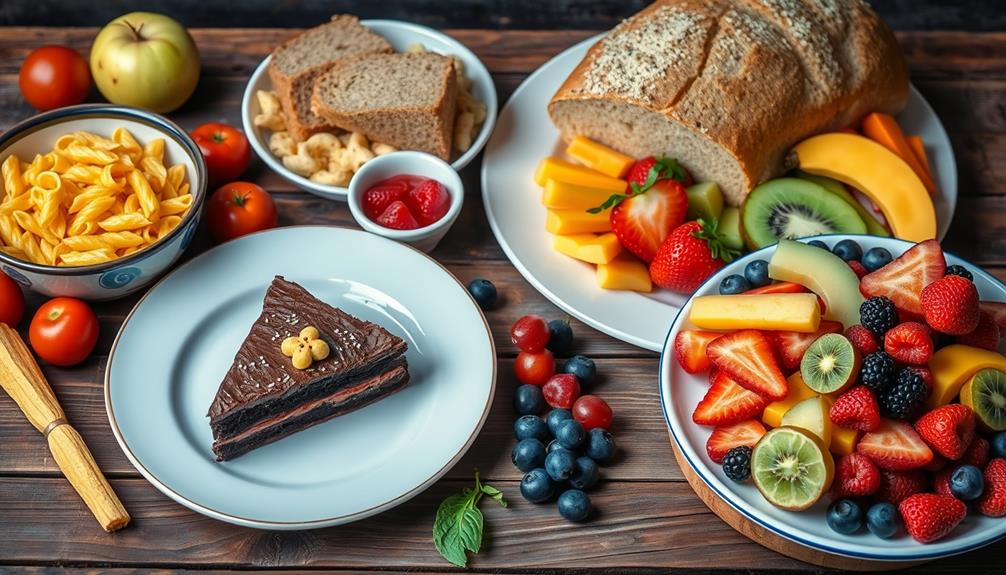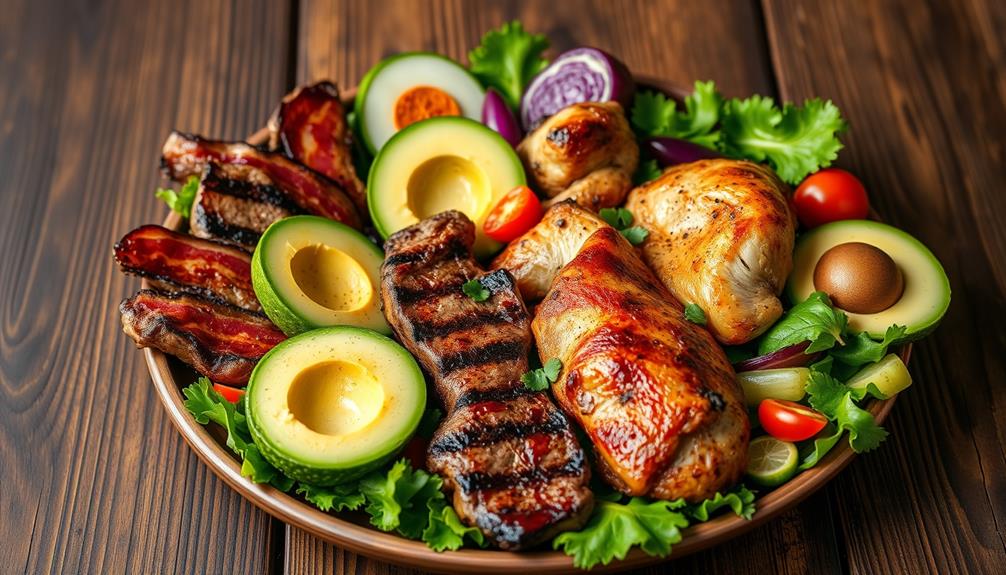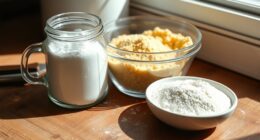To thrive on a keto diet, you need to steer clear of high-carb foods. Avoid grains like rice and wheat, as well as starchy vegetables such as potatoes and corn. Sugary beverages, including soda and fruit juices, can quickly add up in carbs. Processed snacks like chips, granola bars, and pretzels are often loaded with refined carbs too. Additionally, watch out for sweetened dairy products, including flavored yogurts and ice cream, which can have hidden sugars. By keeping these items off your plate, you'll set yourself up for success—and there's much more to explore!
Key Takeaways
- Avoid high-carb grains like rice, wheat, and oats, as they exceed 15 grams of carbs per serving.
- Steer clear of starchy vegetables, such as potatoes and corn, which contain over 30 grams of carbs each.
- Eliminate sugary beverages, including sodas and sweetened juices, which can have up to 39 grams of sugar per serving.
- Refrain from processed snacks like chips and granola bars, often loaded with refined carbs exceeding 20 grams per serving.
- Limit sugary fruits, such as bananas and mangoes, that have high carb counts, like 24 grams for a banana.
High-Carb Foods

When following a keto diet, which high-carb foods should you steer clear of? First off, grains like rice, wheat, and oats are major culprits. They can easily exceed 15 grams of carbohydrates per serving, kicking you out of ketosis.
Starchy vegetables, such as potatoes and corn, are another category you'll want to avoid on a keto diet. Just one medium potato contains over 30 grams of carbs, which can spike blood sugar levels considerably.
Additionally, it's crucial to be aware that certain juices, such as cranberry juice, may also contain hidden sugars that can affect your carb intake, making juice diets a potential challenge for those on keto.
Next, be cautious with sugary fruits. Bananas and mangoes are particularly high in carbs, with bananas packing around 24 grams of net carbs each.
Processed foods like chips, crackers, and pastries are often loaded with refined carbs and added sugars, disrupting your progress.
Finally, legumes, including beans and chickpeas, should be limited too, as they can exceed 20 grams of carbohydrates per serving.
To stay on track with your keto journey, keep these high-carb foods in mind and make mindful choices. By doing so, you'll help maintain your body's state of ketosis and achieve your health goals more effectively.
Sugary Beverages

High-carb foods aren't the only culprits that can sabotage your keto diet; sugary beverages pose a significant threat as well.
These drinks are often packed with sugar and high in carbohydrates, making it tough to stay within your daily carb limit. For instance, a single can of soda can contain up to 39 grams of sugar, which can derail your efforts to maintain ketosis. It's important to be aware of cold medication options that may also contain sugars, as they can unexpectedly contribute to your carb intake.
Fruit juices might seem healthy, but they're usually high in sugar and low in fiber. A typical cup of orange juice has around 24 grams of sugar, leading to blood sugar spikes that you want to avoid on a ketogenic diet.
Sweetened drinks like lemonade or iced teas aren't any better, often containing 20 grams or more of sugar per serving.
Don't forget about alcoholic beverages; beers and dessert wines are high in carbohydrates. A regular beer can pack about 13 grams of carbs per 12-ounce serving, and mixed drinks frequently include sugary mixers that can exceed 30 grams of sugar.
To succeed on your keto diet, it's essential to limit these sugary beverages and choose low-carb alternatives instead.
Starchy Vegetables

Starchy vegetables can quickly derail your keto diet due to their high carbohydrate content. Foods like potatoes, corn, and peas are particularly problematic. A medium potato contains over 30 grams of carbs, while sweet potatoes, often seen as a healthier choice, have around 20 grams of net carbs per medium serving. Even one cup of cooked corn packs about 30 grams of carbs, making it unsuitable for your ketogenic meal plan. Peas may seem nutrient-dense, but they contain about 12 grams of net carbs per cup, which can add up quickly.
Instead of starchy vegetables, focus on non-starchy options that are low in carbs. Here's a quick comparison to guide your choices:
| Vegetable | Net Carbs (per cup) | Notes |
|---|---|---|
| Medium Potato | 30 grams | High in carbohydrates |
| Sweet Potato | 20 grams | Limit on keto |
| Cooked Corn | 30 grams | Too high for ketosis |
| Peas | 12 grams | Can quickly add up |
| Leafy Greens | < 8 grams | Great alternative |
| Cauliflower | < 8 grams | Versatile and low-carb |
| Zucchini | < 8 grams | Excellent for keto dishes |
Stick to these non-starchy vegetables for a successful keto journey!
Processed Snacks
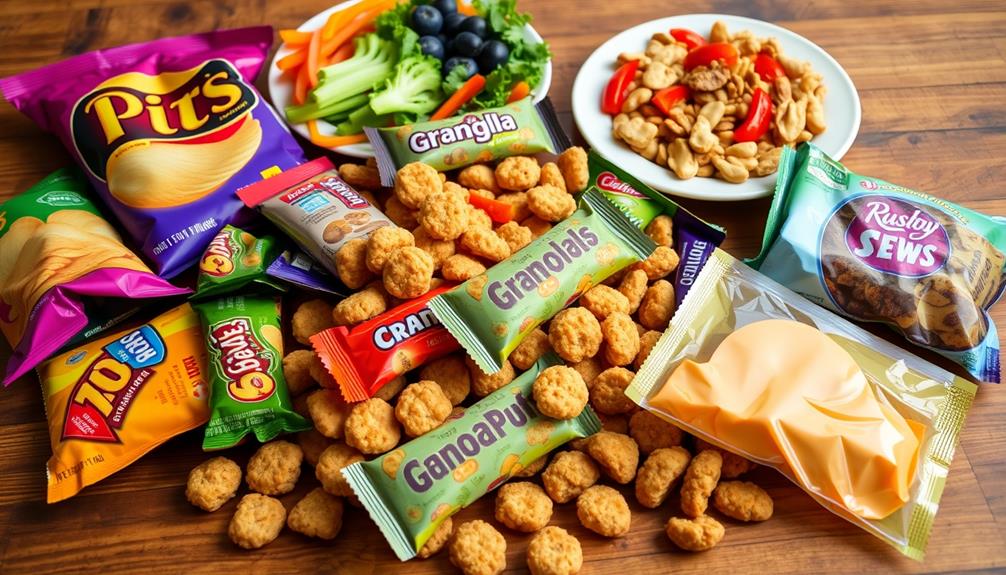
Processed snacks can be a hidden trap for those on a keto diet, as they often contain refined carbohydrates that can easily disrupt ketosis. Many people may not realize that even seemingly healthy options can be misleading; for instance, best ways to make money online often involve careful consideration, just as choosing snacks requires attention to details.
You might think you're making a healthy choice, but many snack foods pack in more carbs than you realize. Here are some common processed snacks to avoid on keto:
- Chips and crackers (often over 15 grams of carbs per serving)
- Granola bars and protein bars (sometimes exceeding 20 grams of carbs)
- Low-fat snacks (usually loaded with added sugars and hidden carbs)
- Pretzels and popcorn (frequently more than 20 grams of carbs)
- Trail mix (can exceed 12 grams of carbs due to fruits and sweeteners)
These processed snacks might seem convenient, but they're often high in carbs and unsuitable for a ketogenic diet.
Even those marketed as healthy can contain added sugars that disrupt your progress. Keep a close eye on the nutrition labels and be wary of any snack that exceeds your carb limit.
Sweetened Dairy Products
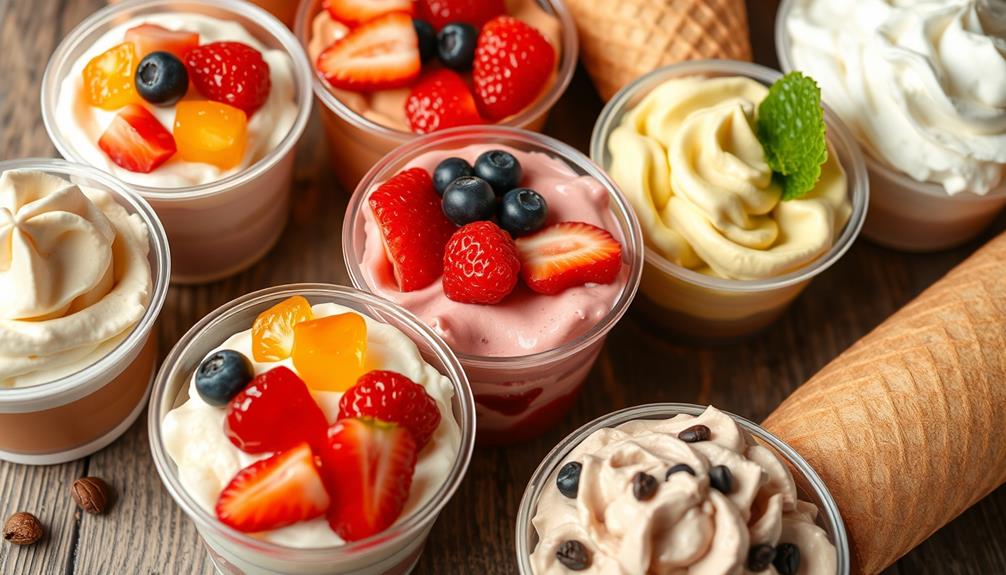
When it comes to maintaining a ketogenic diet, your choices in dairy products can make a significant difference. Sweetened dairy products, like flavored yogurts and ice creams, are often loaded with carbohydrates, which can derail your efforts to stay in a ketogenic state.
For instance, flavored yogurts can contain up to 20 grams of carbohydrates per serving, while some ice creams exceed 30 grams of sugar per serving. These high amounts of sugar are far from ideal if you're aiming for a low-carb diet.
Additionally, avoiding sweetened dairy can help support overall health, similar to how essential oils like eucalyptus oil can promote respiratory health. Whole milk also poses a problem, with approximately 11 grams of net carbs per cup.
Even flavored cottage cheese can lead to issues, as many brands add sugars that push carb counts beyond 6 grams per serving. Instead, opt for plain, full-fat yogurt or Greek yogurt in moderation. These typically have around 6 grams of carbs per serving and are more compatible with keto guidelines.
Frequently Asked Questions
What Foods Can You Not Eat on Keto?
You can't eat high-carb foods like grains, starchy vegetables, and sugary fruits. Processed snacks and sugary drinks should also be avoided. These foods disrupt ketosis and can hinder your progress on the keto diet. The best keto diet foods are those that are low in carbs and high in healthy fats and protein. This includes foods like leafy greens, avocados, nuts, seeds, and fatty fish. Incorporating these foods into your diet will help maintain ketosis and support your overall health and wellness on the keto diet. It’s important to focus on whole, nutrient-dense foods to achieve the best results.
What Are the Worse Foods on Keto Diet?
When considering the worst foods on a keto diet, you'll want to steer clear of high-carb fruits, starchy vegetables, sugary drinks, refined carbs, and processed snacks, as they can disrupt your ketosis efforts.
What Foods Are Surprisingly Not Keto?
You might think some foods are healthy, but they can actually derail your keto goals. High-sugar fruits, starchy veggies, and processed snacks often contain hidden carbs that can disrupt your ketosis. Stay vigilant!
What Are Big Mistakes on Keto?
You might overlook hidden carbs in sauces, misjudge portion sizes, or rely too much on processed foods. Don't forget hydration and adjust your macronutrient ratios; these mistakes can hinder your keto success considerably.
Conclusion
In the world of keto, it's essential to choose wisely. While a slice of cake may tempt you with its sweetness, it can easily derail your progress. Instead, embrace the vibrant greens and healthy fats that fuel your body. Remember, each bite is a step toward your goals. By avoiding high-carb foods, sugary drinks, and processed snacks, you're not just saying no to certain treats; you're saying yes to a healthier, more energized you.
